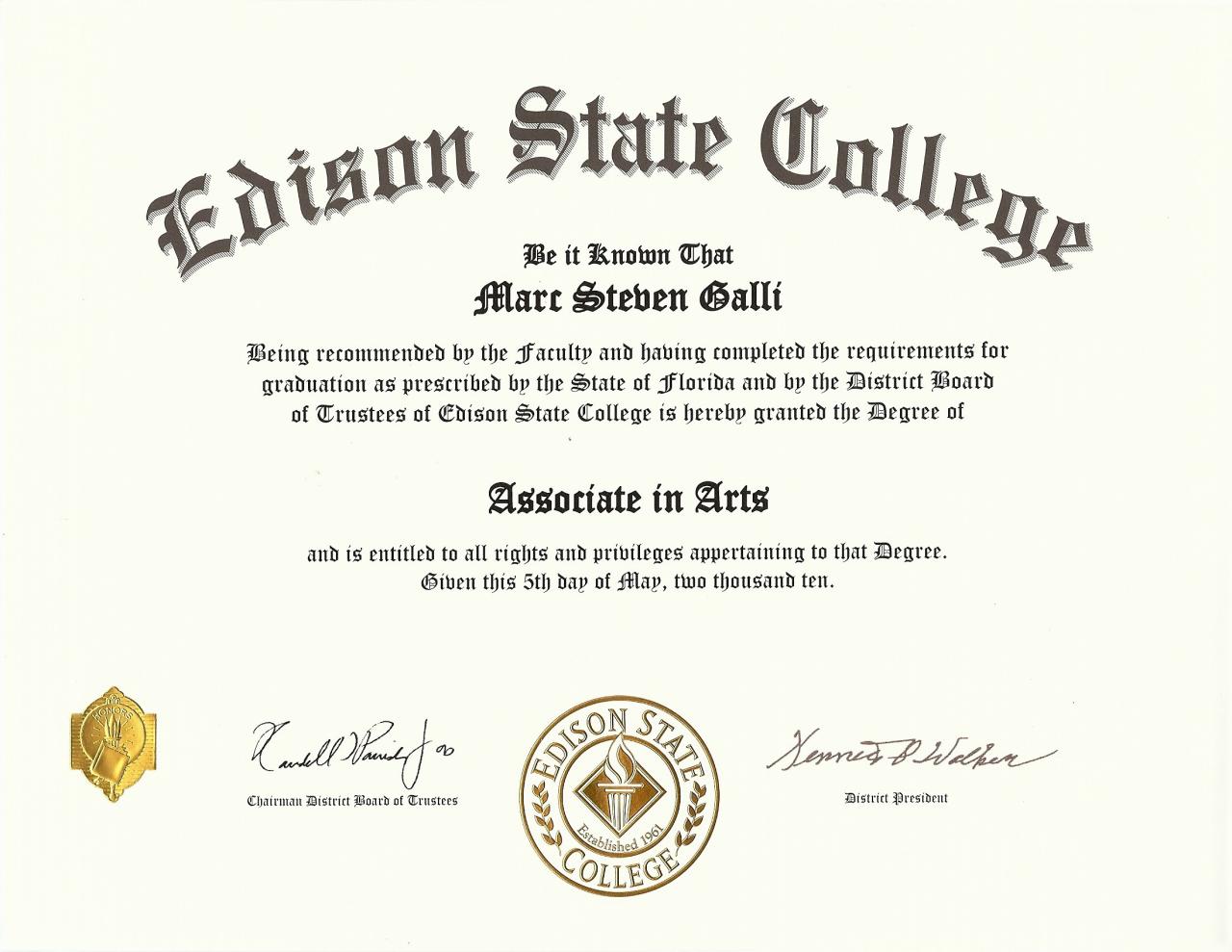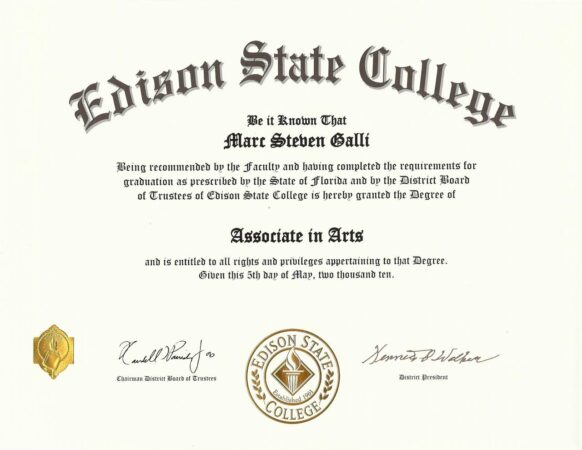Associate degree vs bachelor – these two paths can seem like a confusing maze when it comes to your future. Choosing the right one can be daunting, but understanding the differences can help you navigate this educational journey with confidence. An associate degree is a two-year program, typically focusing on a specific career field, while a bachelor’s degree is a four-year program offering a broader educational base. This guide will explore the pros and cons of each, helping you determine which path best aligns with your goals and aspirations.
Both associate and bachelor degrees hold unique advantages and disadvantages. Associate degrees offer a faster and often more affordable route to entering the workforce, while bachelor’s degrees provide a more comprehensive education and open doors to a wider range of career options. The choice ultimately comes down to your individual needs and aspirations.
Definition and Overview

An associate degree and a bachelor’s degree are both post-secondary academic credentials, but they differ significantly in terms of duration, curriculum, and focus. Understanding these differences is crucial for individuals seeking to pursue higher education and build a successful career.
Associate degrees are typically two-year programs designed to provide students with specialized knowledge and skills in a particular field. Bachelor’s degrees, on the other hand, are four-year programs that offer a broader education, covering a wider range of subjects and preparing graduates for more advanced roles.
Associate Degree Programs
Associate degrees are designed to provide students with the foundational knowledge and skills needed for entry-level positions or further education.
Common associate degree programs include:
- Associate of Arts (AA): This degree provides a liberal arts education, focusing on subjects like humanities, social sciences, and the arts. It prepares students for transfer to a four-year institution or for careers in fields such as teaching, writing, and communications.
- Associate of Science (AS): This degree emphasizes science, technology, engineering, and mathematics (STEM) subjects. It prepares students for entry-level positions in technical fields like computer science, engineering, and healthcare.
- Associate of Applied Science (AAS): This degree focuses on practical skills and technical knowledge, preparing students for specific careers in fields such as business, technology, and healthcare.
Bachelor’s Degree Programs, Associate degree vs bachelor
Bachelor’s degrees are designed to provide students with a comprehensive education in a specific field of study, preparing them for advanced roles and leadership positions.
Common bachelor’s degree programs include:
- Bachelor of Arts (BA): This degree emphasizes humanities, social sciences, and the arts. It prepares students for careers in fields such as education, writing, journalism, and public relations.
- Bachelor of Science (BS): This degree focuses on science, technology, engineering, and mathematics (STEM) subjects. It prepares students for careers in fields such as engineering, computer science, biology, and chemistry.
- Bachelor of Business Administration (BBA): This degree focuses on business principles and practices, preparing students for careers in management, finance, marketing, and accounting.
Career Paths and Job Market
The choice between an associate degree and a bachelor’s degree significantly impacts career paths and job market opportunities. While both degrees offer valuable skills and knowledge, the level of education typically determines the types of positions, salary potential, and career advancement possibilities.
Career Paths and Salary Differences
The career paths available with an associate degree are generally more focused on technical and vocational roles. These degrees often prepare individuals for specific trades, skilled labor positions, or entry-level roles in various industries. In contrast, a bachelor’s degree provides a broader foundation of knowledge, opening doors to more specialized and management-level positions.
- Associate Degree: Typical career paths include:
- Technical and Skilled Trades: Electricians, plumbers, welders, HVAC technicians, automotive technicians, and other skilled trades require an associate degree or vocational certification. These roles often involve hands-on training and practical skills.
- Entry-Level Positions: Associate degrees can qualify individuals for entry-level positions in fields like healthcare (medical assistants, dental hygienists), business (accounting assistants, administrative assistants), and technology (network technicians, computer support specialists).
- Community College Faculty: Some associate degree holders may pursue careers as instructors or professors at community colleges, teaching courses in their areas of expertise.
- Bachelor’s Degree: Typical career paths include:
- Professional Roles: Bachelor’s degrees are often required for professional roles such as teachers, nurses, social workers, engineers, accountants, and business analysts. These positions typically involve higher levels of responsibility and decision-making.
- Management and Leadership: Bachelor’s degrees provide the foundation for management and leadership positions in various industries. Individuals with bachelor’s degrees may be eligible for roles like project managers, supervisors, and department heads.
- Advanced Studies: A bachelor’s degree is typically a prerequisite for pursuing graduate studies, such as master’s or doctoral degrees, which can open doors to specialized careers in research, academia, and higher-level professional roles.
The salary differences between associate degree and bachelor’s degree holders are significant. While there are exceptions, individuals with bachelor’s degrees generally earn higher salaries than those with associate degrees. This is due to factors such as increased responsibility, specialized knowledge, and potential for career advancement.
According to the U.S. Bureau of Labor Statistics, the median annual salary for workers with a bachelor’s degree in 2022 was $77,000, while the median annual salary for workers with an associate degree was $47,000.
Industries Where an Associate Degree is Sufficient
An associate degree can be a valuable asset in industries where technical skills and practical experience are highly valued. These industries often offer entry-level positions that provide opportunities for career advancement with continued training and experience.
- Healthcare: Associate degrees are common for entry-level healthcare roles such as medical assistants, dental hygienists, and pharmacy technicians.
- Skilled Trades: Trades like plumbing, electrical work, welding, and HVAC require an associate degree or vocational certification.
- Technology: Associate degrees can prepare individuals for entry-level positions in computer support, network administration, and other technical roles.
- Manufacturing: Manufacturing industries often employ individuals with associate degrees in fields like engineering technology, industrial technology, and quality assurance.
Industries Where a Bachelor’s Degree is Preferred or Required
In industries where higher levels of education and specialized knowledge are required, a bachelor’s degree is generally preferred or even mandatory. These industries often involve complex problem-solving, research, and strategic decision-making.
- Education: A bachelor’s degree is typically required for teaching positions at the elementary, middle, and high school levels.
- Finance and Accounting: Bachelor’s degrees in finance, accounting, or business administration are essential for careers in these fields, particularly for roles such as financial analysts, accountants, and financial managers.
- Engineering: Engineering fields require a bachelor’s degree, often in a specific engineering discipline such as civil, mechanical, or electrical engineering.
- Healthcare (Advanced Roles): While an associate degree can lead to entry-level healthcare positions, advanced roles such as registered nurses, physicians, and pharmacists require a bachelor’s degree or higher.
- Law: A bachelor’s degree is a prerequisite for law school, which leads to a Juris Doctor (JD) degree and a career as a lawyer.
Cost and Time Commitment

The financial and time commitment associated with earning an associate degree or a bachelor’s degree are crucial factors to consider when making an educational decision. This section explores the typical costs and timeframes involved in each degree program, providing insights to help you make an informed choice.
Cost Comparison
The cost of obtaining an associate degree or a bachelor’s degree varies depending on the institution, program of study, and individual circumstances. Here’s a breakdown of the major cost components:
- Tuition and Fees: Tuition fees are the primary expense associated with higher education. Public institutions typically have lower tuition rates than private institutions. Fees may include costs for registration, technology, student activities, and other services.
- Living Expenses: Living expenses can vary significantly depending on the location and lifestyle. They include housing, food, transportation, utilities, and personal expenses.
- Books and Materials: Textbooks, course materials, and other supplies can add up over the course of a degree program.
- Other Expenses: Additional costs may include transportation, childcare, healthcare, and personal expenses.
Time Commitment Comparison
The time commitment required to complete an associate degree or a bachelor’s degree is another important consideration. Here’s a general overview of the typical duration:
- Associate Degree: An associate degree typically takes two years of full-time study, or four semesters. Some programs may be shorter or longer depending on the institution and the specific program of study.
- Bachelor’s Degree: A bachelor’s degree typically takes four years of full-time study, or eight semesters. Some programs may be longer, such as those in engineering, medicine, or law.
Average Cost and Time Commitment
The following table provides an estimated average cost and time commitment for obtaining an associate degree and a bachelor’s degree in various fields of study. It’s important to note that these are just estimates, and actual costs and timeframes may vary.
| Field of Study | Associate Degree (Average Cost) | Associate Degree (Average Time) | Bachelor’s Degree (Average Cost) | Bachelor’s Degree (Average Time) |
|---|---|---|---|---|
| Business | $20,000 – $30,000 | 2 years | $60,000 – $90,000 | 4 years |
| Nursing | $25,000 – $35,000 | 2 years | $70,000 – $100,000 | 4 years |
| Computer Science | $18,000 – $28,000 | 2 years | $55,000 – $85,000 | 4 years |
| Education | $15,000 – $25,000 | 2 years | $45,000 – $75,000 | 4 years |
It’s crucial to remember that these figures are averages and may vary based on individual circumstances and institutional factors.
Transferability and Further Education
Earning an associate degree can be a stepping stone to a bachelor’s degree, providing a strong foundation for advanced studies. This section explores the transferability of credits earned from associate degree programs and the opportunities for pursuing further education.
Transferability of Credits
Transferability of credits from an associate degree program to a bachelor’s degree program is crucial for students seeking to continue their education. Many colleges and universities have established articulation agreements or pathways that ensure smooth transitions for associate degree holders.
Articulation agreements are formal agreements between institutions that Artikel the transferability of specific courses and credits.
These agreements specify which courses from an associate degree program will transfer to a bachelor’s degree program and how those credits will be applied toward the bachelor’s degree requirements.
Transfer Pathways and Articulation Agreements
Several institutions offer transfer pathways and articulation agreements to facilitate the transition from an associate degree to a bachelor’s degree. For instance, many community colleges have articulation agreements with four-year universities in their state.
- State-Level Agreements: Many states have statewide articulation agreements that simplify the transfer process between community colleges and public universities within the state. These agreements often guarantee that specific associate degrees will transfer seamlessly into specific bachelor’s degree programs at participating universities.
- Institutional Agreements: Individual colleges and universities may also have articulation agreements with specific community colleges or other institutions. These agreements may cover a wide range of associate degree programs and bachelor’s degree programs, allowing students to transfer credits smoothly.
Benefits of Further Education
Earning an associate degree can open doors to further education and career advancement. Pursuing a bachelor’s degree or even a master’s degree after an associate degree can offer numerous benefits:
- Increased Earning Potential: Higher education levels are generally associated with higher salaries. A bachelor’s degree or a master’s degree can significantly enhance earning potential compared to holding only an associate degree.
- Career Advancement: Many professions require a bachelor’s degree or a master’s degree for advancement. A higher degree can qualify you for more senior roles, leadership positions, and specialized career paths.
- Expanded Career Options: A bachelor’s degree or a master’s degree can open doors to a wider range of career options. You may be able to explore fields that require advanced education, increasing your career flexibility and potential.
Challenges of Further Education
While pursuing further education can be rewarding, it also presents some challenges:
- Time Commitment: Earning a bachelor’s degree or a master’s degree requires a significant time commitment. Balancing work, family, and academic responsibilities can be demanding.
- Financial Considerations: Tuition fees, living expenses, and other educational costs can be substantial. Financial planning and exploring financial aid options are essential.
- Academic Rigor: The academic demands of a bachelor’s degree or a master’s degree can be more challenging than those of an associate degree program. Students need to be prepared for a higher level of academic rigor.
Personal Considerations and Goals
The decision between pursuing an associate degree or a bachelor’s degree is deeply personal and should be made based on your individual circumstances, goals, and aspirations. Carefully evaluating your personal situation and ambitions is crucial to making an informed choice that aligns with your long-term success.
Decision Tree for Choosing Between Associate and Bachelor’s Degrees
A decision tree can help you visualize the key factors to consider when making this choice. Start by asking yourself the following questions:
- What are your short-term and long-term career goals? Do you have a specific career path in mind, or are you still exploring different options?
- What is your desired salary range? Research the average salaries for different positions within your chosen field and determine if an associate degree or a bachelor’s degree is typically required.
- How much time and money are you willing to invest in your education? Consider the cost of tuition, books, and living expenses, as well as the time commitment required to complete each degree program.
- Are you interested in transferring your associate degree to a bachelor’s program later? If so, research transfer options and make sure the associate degree program you choose is compatible with your desired bachelor’s program.
- What are your personal interests and strengths? Choose a degree program that aligns with your passions and abilities to increase your chances of success and job satisfaction.
Based on your answers to these questions, you can navigate the decision tree and make a more informed choice.
Examples of Successful Career Paths with Associate and Bachelor’s Degrees
Many individuals have achieved successful careers with both associate and bachelor’s degrees. Here are a few examples:
- Associate Degree: A skilled technician with an associate degree in electronics may find employment at a technology company, working on projects that require specialized knowledge.
- Bachelor’s Degree: An individual with a bachelor’s degree in business administration may start their career as a management trainee, eventually rising to a leadership position within their company.
Factors to Consider When Making the Decision
- Personal Interests: Choose a degree program that aligns with your passions and interests, as this will increase your motivation and enjoyment during your studies.
- Career Goals: Research the educational requirements for your desired career path and choose a degree program that will provide the necessary skills and knowledge.
- Financial Resources: Consider the cost of tuition, books, and living expenses for each degree program. Evaluate your financial situation and determine whether you can afford the costs associated with each option.
- Time Constraints: Assess your current commitments and determine how much time you can realistically dedicate to your studies. Consider the time commitment required to complete each degree program and choose an option that fits your schedule.
- Transferability: If you are considering pursuing a bachelor’s degree after an associate degree, research transfer options and ensure that your associate degree program is compatible with your desired bachelor’s program.
Final Conclusion: Associate Degree Vs Bachelor

Ultimately, the decision of whether to pursue an associate degree or a bachelor’s degree is a personal one. By carefully considering your career aspirations, financial resources, and time constraints, you can make an informed choice that sets you on the path to achieving your goals. Remember, both degrees hold value and can lead to successful and fulfilling careers. The key is to choose the path that aligns with your individual needs and aspirations.
Questions and Answers
What is the difference between an associate degree and a bachelor’s degree?
An associate degree is a two-year program typically focused on a specific career field, while a bachelor’s degree is a four-year program offering a broader education and often leads to more advanced career options.
Can I transfer my associate degree credits to a bachelor’s program?
Yes, many colleges and universities offer transfer programs for associate degree holders. However, the number of credits that transfer can vary depending on the specific program and institution.
Is an associate degree enough to get a good job?
It depends on the field. Some industries require a bachelor’s degree, while others may accept an associate degree for entry-level positions. Research the specific job requirements you are interested in.
What are some examples of associate degree programs?
Common associate degree programs include Associate of Arts (AA), Associate of Science (AS), Associate of Applied Science (AAS), and Associate of Business Administration (ABA). Specific fields include nursing, accounting, computer programming, and early childhood education.

